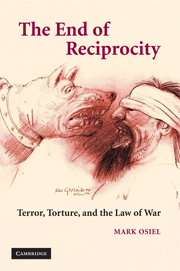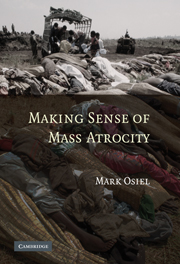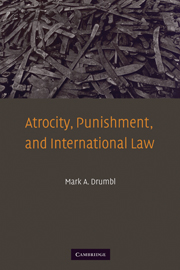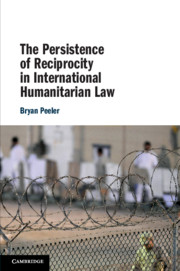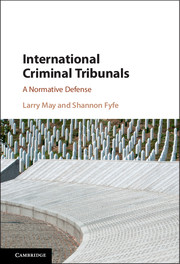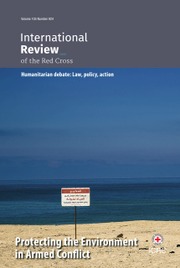The End of Reciprocity
Terror, Torture, and the Law of War
- Author: Mark Osiel, College of Law, University of Iowa and T. M. C. Asser Institute, The Hague
- Date Published: May 2009
- availability: Available
- format: Paperback
- isbn: 9780521730143
Paperback
Other available formats:
Hardback, eBook
Looking for an inspection copy?
Please email [email protected] to enquire about an inspection copy of this book
-
Why should America restrain itself in detaining, interrogating, and targeting terrorists when they show it no similar forbearance? Is it fair to expect one side to fight by more stringent rules than the other, placing itself at disadvantage? Is the disadvantaged side then permitted to use the tactics and strategies of its opponent? If so, then America's most controversial counterterrorism practices are justified as commensurate responses to indiscriminate terror. Yet different ethical standards prove entirely fitting, the author finds, in a conflict between a network of suicidal terrorists seeking mass atrocity at any cost and a constitutional democracy committed to respecting human dignity and the rule of law. The most important reciprocity involves neither uniform application of fair rules nor their enforcement by a simple-minded tit-for-tat. Real reciprocity instead entails contributing to an emergent global contract that encompasses the law of war and from which all peoples may mutually benefit.
Read more- Addresses key contemporary issues, such as 'torture debate' and 'global war on terror'
Reviews & endorsements
'Many books have now been written about the law and ethics of how states should respond to terrorists who respect neither. This book may be the most impressive of them all: a hardheaded, clear-eyed, unsentimental argument for observing humanitarian restraints in the law of armed conflict even when adversaries do not. Drawing on deep reservoirs of learning in the law, history and sociology of armed conflict, Osiel challenges both critics and defenders of the Bush Administration's anti-terror policies: idealist human-rights advocates who prescribe absolute adherence to moral norms regardless of what enemies do, and 'realists' who want to calculate in each case whether adherence will yield more benefits to national self-interest than costs. Ultimately he suggests that acting upon national self-conceptions of civilized conduct rooted in honor may induce the cooperation of other nations in building the networks that constitute a social contract. Neither blinding himself to the savagery and brutality of modern conflict nor falling into a shallow cynicism, Osiel offers a penetrating analysis of current policies and the controversies over them and a grounded, carefully reasoned, basis for hope for something better.' Robert W. Gordon, Yale University
See more reviews'This is a wonderfully provocative study of an important question by a highly regarded and thoughtful author. What more could you ask for? The End of Reciprocity is well researched and meticulously documented; serious and scholarly. It addresses the tough question of reciprocity head-on and fearlessly. Osiel's arguments are both persuasive and balanced. This is a valuable read for anyone who cares about how the United States wages war now and in the future.' John Hutson, Admiral (Ret.), Judge Advocate General of the Navy, 1997–2000, and Franklin Pierce Law School
'Mark Osiel has a talent for looking squarely into abysses and clarifying, for the rest of us, what is involved in such issues as torture or attempting to bring some sort of moral order to modern warfare, including wars against terrorists. His new book is profound, illuminating, and unsettling. It deserves wide readership and, just as importantly, discussion.' Sanford Levinson, University of Texas, Austin and the W. St John Garwood and W. St John Garwood, Jr Centennial Chair
Mark Osiel examines questions at the heart of today's most vexing issues in the 'war on terrorism.' With a scholar's eye and an intellect informed by broad international legal experience, he asks if reciprocity remains an appropriate guide to American battlefield conduct when dealing with an enemy who neither respects nor recognizes traditional bounds on combatant behavior … Even those who disagree with Professor Osiel's arguments, as I deeply do, will reexamine their own legal and moral positions in light of his skilled arguments that blend law, history, ethics and realpolitik. This is a work of scholarship and intelligence that everyone concerned with the rights and duties of states and non-state actors should read.' Gary Solis, Marine Lt. Col. (Ret.), Judge Advocate General, West Point and Georgetown University Law Center
'Mark Osiel's The End of Reciprocity: Terror, Torture, and the Law of War provides detailed discussions of a number of important moral and legal issues arising for the United States in its ongoing response to the threats posed by the Al Qaeda terrorist network … Osiel offers a distinctive and provocative view on these issues, and displays a wide knowledge of relevant literature in a number of fields, including international law, philosophy, sociology and cultural studies. As such, the book ought to be of interest to a wide audience.' Criminal Law and Philosophy
Customer reviews
Not yet reviewed
Be the first to review
Review was not posted due to profanity
×Product details
- Date Published: May 2009
- format: Paperback
- isbn: 9780521730143
- length: 676 pages
- dimensions: 230 x 152 x 30 mm
- weight: 0.9kg
- availability: Available
Table of Contents
Introduction
Part I. Reciprocity in Humanitarian Law:
1. Reciprocity in the law of war: ambient sightings, ambivalent soundings
2. Reciprocity in humanitarian law: acceptance and repudiation
3. Humanitarian vs. human rights law: the coming clash
Part II. The Ethics of Torture as Reciprocity:
4. Is torture uniquely degrading? The unpersuasive answer of liberal jurisprudence
5. Fairness in terrorist war (1): Rawlsian reciprocity
6. Fairness in terrorist war (2): Kantian reciprocity
7. Humanitarian law as corrective justice: do targeted killing and torture 'correct' for terror?
Part III. Reciprocity in the Social Science of War:
8. Reciprocity as civilization: the terrorist as savage
9. The inflationary rhetoric of terrorist threat: humanitarian law as deflationary check
10. Reciprocity as tit-for-tat: rational retaliation in modern war
11. The 'gift' of humanitarianism: soft power and benevolent signaling
Part IV. The End of Reciprocity:
12. Sources of national restraint in martial honor: the JAGs' intercession
13. Sources of anti-reciprocity in national self-respect and transnational identity
Conclusion.
Sorry, this resource is locked
Please register or sign in to request access. If you are having problems accessing these resources please email [email protected]
Register Sign in» Proceed
You are now leaving the Cambridge University Press website. Your eBook purchase and download will be completed by our partner www.ebooks.com. Please see the permission section of the www.ebooks.com catalogue page for details of the print & copy limits on our eBooks.
Continue ×Are you sure you want to delete your account?
This cannot be undone.
Thank you for your feedback which will help us improve our service.
If you requested a response, we will make sure to get back to you shortly.
×
